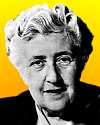 (source)
(source)
|
Agatha Christie
(15 Sep 1891 - 12 Jan 1975)
English writer whose crime novels, short stories and plays remain very popular.
|
Science Quotes by Agatha Christie (4 quotes)
“I think you’re begging the question,” said Haydock, “and I can see looming ahead one of those terrible exercises in probability where six men have white hats and six men have black hats and you have to work it out by mathematics how likely it is that the hats will get mixed up and in what proportion. If you start thinking about things like that, you would go round the bend. Let me assure you of that!”
— Agatha Christie
In The Mirror Crack’d (1962), 190.
Doctors can do almost anything nowadays, can't they, unless they kill you while they're trying to cure you.
— Agatha Christie
Endless Night (2002), 117.
I continued to do arithmetic with my father, passing proudly through fractions to decimals. I eventually arrived at the point where so many cows ate so much grass, and tanks filled with water in so many hours I found it quite enthralling.
— Agatha Christie
In Agatha Christie: An Autobiography (1977), 89.
I don’t think necessity is the mother of invention. Invention, in my opinion, arises directly from idleness, possibly also from laziness—to save oneself trouble.
— Agatha Christie
In An Autobiography (1977, 19990), 121.
Quotes by others about Agatha Christie (3)
[Agatha Christie] is fond of quoting the witty wife who once said, “an archaeologist is the best husband any woman can have; the older she gets, the more interested he is in her.”
In Nigel Dennis, 'Genteel Queen of Crime: Agatha Christie Puts Her Zest for Life Into Murder', Life (14 May 1956), 40, No. 20, 102. Christie’s (second) husband, Max Mallowan, was an archaeologist. However, a biographical source states that Christie disavowed making the remark. So, it must be regarded as a funny quote of uncertain origin.
...the remark attributed to Mrs. [Agatha] Christie that 'the older you get, the more interesting you become to an archaeologist,' was the creation of some pundit whose neck Mrs. Christie would be glad to wring if he would care to identify himself—she neither made the remark nor does she consider it particularly complimentary or amusing.
Gordon Ramsey, Agatha Christie: Mistress of Mystery (1967), 23. In Russell H. Fitzgibbon, The Agatha Christie Companion 1980), 22.
The discovery of an interaction among the four hemes made it obvious that they must be touching, but in science what is obvious is not necessarily true. When the structure of hemoglobin was finally solved, the hemes were found to lie in isolated pockets on the surface of the subunits. Without contact between them how could one of them sense whether the others had combined with oxygen? And how could as heterogeneous a collection of chemical agents as protons, chloride ions, carbon dioxide, and diphosphoglycerate influence the oxygen equilibrium curve in a similar way? It did not seem plausible that any of them could bind directly to the hemes or that all of them could bind at any other common site, although there again it turned out we were wrong. To add to the mystery, none of these agents affected the oxygen equilibrium of myoglobin or of isolated subunits of hemoglobin. We now know that all the cooperative effects disappear if the hemoglobin molecule is merely split in half, but this vital clue was missed. Like Agatha Christie, Nature kept it to the last to make the story more exciting. There are two ways out of an impasse in science: to experiment or to think. By temperament, perhaps, I experimented, whereas Jacques Monod thought.
From essay 'The Second Secret of Life', collected in I Wish I'd Made You Angry Earlier (1998), 263-5.
 In science it often happens that scientists say, 'You know that's a really good argument; my position is mistaken,' and then they would actually change their minds and you never hear that old view from them again. They really do it. It doesn't happen as often as it should, because scientists are human and change is sometimes painful. But it happens every day. I cannot recall the last time something like that happened in politics or religion.
(1987) --
In science it often happens that scientists say, 'You know that's a really good argument; my position is mistaken,' and then they would actually change their minds and you never hear that old view from them again. They really do it. It doesn't happen as often as it should, because scientists are human and change is sometimes painful. But it happens every day. I cannot recall the last time something like that happened in politics or religion.
(1987) -- 


